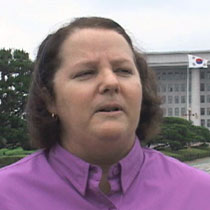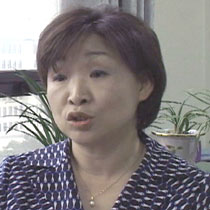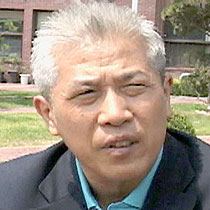-
(单词翻译:双击或拖选)
Seoul
02 July 2007
U.S. President George Bush and South Korean President Roh Moo-hyun signed a wide-ranging trade liberalization agreement Saturday. Legislators in both countries will need to vote on whether to ratify1 the treaty. As VOA's Kurt Achin reports from Seoul, passage is not a sure thing.
For some Koreans, the pending2 free trade agreement is a mouthwatering prospect3.
Supporters say South Korean food consumers may benefit the most. Increased imports of U.S. agricultural products are expected to push down prices and expand selection.
The deal also is expected to create high-salary jobs in South Korea's knowledge-intensive industries.
But the agreement faces opposition4 both in the U.S. Congress, and here, in South Korea's National Assembly.
 |
| Tami Overby |
"The changes that this FTA [free trade agreement] will help [South] Korea, will ensure [South] Korea's future competitiveness. This FTA will help ensure that they have preferential access into the largest market in the world," she adds.
 |
| Shim Sang Jong |
Shin Yong-beom farms rice and other produce about 200 kilometers south of Seoul. He has taken part in many demonstrations9 against the deal in South Korea. He says it will unfairly make small South Korean farms compete with big U.S. farms run by companies.
"What the government calls competition with U.S. farmers is actually competition with multinational10 corporations,” he says. “That's not a fair arrangement."
A different kind of opposition to the deal is emerging in the United States. U.S. carmakers Ford11 and Chrysler say it does not give them the access they want to South Korea's market. Many U.S. lawmakers say they oppose the deal.
At Seoul National University, Lee Dong Kee is a professor of business administration. He says some South Koreans do not understand how dependent their economy is on global trade.
 |
| Lee Dong Kee |
Experts such as Lee say the South Korea-U.S. trade agreement symbolizes12 a commitment to making that leap -- and lays the foundation for similar deals with China, the European Union, and elsewhere.
* - This report initially13 incorrectly identified Ms. Overby as executive director.
 收听单词发音
收听单词发音
1
ratify

|
|
| v.批准,认可,追认 | |
参考例句: |
|
|
|
2
pending

|
|
| prep.直到,等待…期间;adj.待定的;迫近的 | |
参考例句: |
|
|
|
3
prospect

|
|
| n.前景,前途;景色,视野 | |
参考例句: |
|
|
|
4
opposition

|
|
| n.反对,敌对 | |
参考例句: |
|
|
|
5
chamber

|
|
| n.房间,寝室;会议厅;议院;会所 | |
参考例句: |
|
|
|
6
labor

|
|
| n.劳动,努力,工作,劳工;分娩;vi.劳动,努力,苦干;vt.详细分析;麻烦 | |
参考例句: |
|
|
|
7
legislative

|
|
| n.立法机构,立法权;adj.立法的,有立法权的 | |
参考例句: |
|
|
|
8
laborers

|
|
| n.体力劳动者,工人( laborer的名词复数 );(熟练工人的)辅助工 | |
参考例句: |
|
|
|
9
demonstrations

|
|
| 证明( demonstration的名词复数 ); 表明; 表达; 游行示威 | |
参考例句: |
|
|
|
10
multinational

|
|
| adj.多国的,多种国籍的;n.多国籍公司,跨国公司 | |
参考例句: |
|
|
|
11
Ford

|
|
| n.浅滩,水浅可涉处;v.涉水,涉过 | |
参考例句: |
|
|
|
12
symbolizes

|
|
| v.象征,作为…的象征( symbolize的第三人称单数 ) | |
参考例句: |
|
|
|
13
initially

|
|
| adv.最初,开始 | |
参考例句: |
|
|
|















